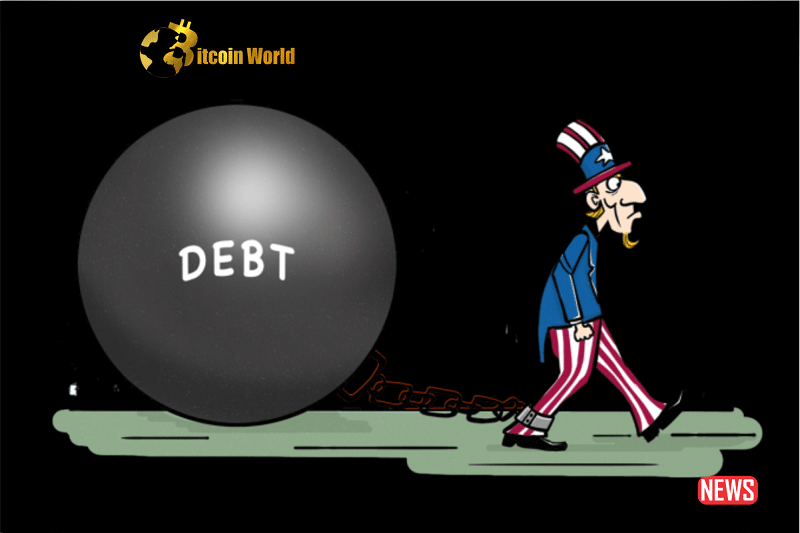Phew! Could crypto miners be catching a break in the midst of the high-stakes U.S. debt ceiling drama? It looks like a proposed energy tax targeting cryptocurrency miners might be off the table, thanks to a tentative deal aimed at preventing a potential government default. Let’s dive into what’s happening and what it could mean for the crypto world.
A Tentative Deal to Avert Disaster: What’s the Buzz?
Imagine the financial equivalent of a Hollywood cliffhanger. That’s been the U.S. debt ceiling situation. The government was facing a deadline to raise its borrowing limit, or risk defaulting on its obligations – a scenario no one wanted. After some intense negotiations, a preliminary agreement has been reached between President Biden and House Speaker McCarthy. Ohio Representative Warren Davidson even dropped a hint that this deal might have a positive side effect for crypto miners.
Here’s the gist of the proposed deal:
- Debt Ceiling Suspension: The plan is to suspend the debt ceiling for two years. This means the U.S. government can keep borrowing money to pay its bills.
- Avoiding Default: This is the big one! The agreement aims to prevent the U.S. from defaulting on its debt, which would have serious global economic consequences.
- No Corporate/High-Income Tax Hikes (Maybe): President Biden initially wanted to raise taxes on corporations and high earners, but this might not be part of the final deal.
The Crypto Miner Tax: Headed for the Exit?
Now, for the part that has crypto enthusiasts cheering (cautiously). Remember that proposed 30% tax on the electricity used by crypto miners that was lurking in President Biden’s FY2024 budget? Well, according to Representative Davidson’s tweet on May 28th, this tax might be blocked as part of the debt ceiling agreement! This potential tax, if it had gone through, would have meant a 10% annual increase over three years starting in 2024. Ouch!
Why was this tax proposed in the first place? The idea was likely to generate revenue and potentially disincentivize energy-intensive crypto mining operations. However, the crypto community largely viewed it as a punitive measure that could stifle innovation and growth in the sector.
A Sigh of Relief for Crypto Miners?
If this tax is indeed scrapped, it would be a significant win for the cryptocurrency mining industry. Think about it:
- Reduced Operational Costs: Electricity is a major expense for miners. Avoiding this tax would mean lower operating costs, making mining more profitable.
- Increased Investment Confidence: The threat of this tax has likely created uncertainty in the industry. Its removal could boost investor confidence and encourage further investment.
- Continued Innovation: Without the added financial burden, miners can focus on innovation and developing more efficient and sustainable mining practices.
Challenges Still Looming
Hold on to your hats, though! This deal isn’t a done deal yet. President Biden himself acknowledged that it’s a compromise, meaning nobody got everything they wanted. And the bill still needs to pass through a divided House of Representatives. Speaker McCarthy faces opposition from some within his own party, so the road to final approval could be bumpy.
What are the potential hurdles?
- Divisions in the House: Getting enough votes from both sides of the aisle might be challenging given the current political climate.
- Individual Lawmaker Concerns: Some lawmakers might have specific objections to certain parts of the bill, potentially leading to amendments or even opposition.
- The Imminent Deadline: The clock is ticking, with the debt default deadline looming in June. Any delays or roadblocks could increase the risk of a crisis.
What Happens Next?
The next big date to watch is May 31st, when a meeting and vote on the legislation are scheduled. The cryptocurrency community, along with the rest of the financial world, will be watching closely to see if this tentative deal can clear the hurdles and become a reality.
A Glimmer of Hope, But Stay Tuned
The potential elimination of the energy tax on crypto miners as part of this debt ceiling deal offers a glimmer of hope for the industry. It highlights the ongoing discussions and considerations surrounding cryptocurrency regulation within the U.S. government. While the situation remains fluid and the final outcome is uncertain, this development underscores the growing recognition of the crypto sector’s importance. If successful, this agreement could pave the way for continued growth and innovation in the crypto space, free from the immediate threat of this specific tax burden.
Disclaimer: The information provided is not trading advice, Bitcoinworld.co.in holds no liability for any investments made based on the information provided on this page. We strongly recommend independent research and/or consultation with a qualified professional before making any investment decisions.




